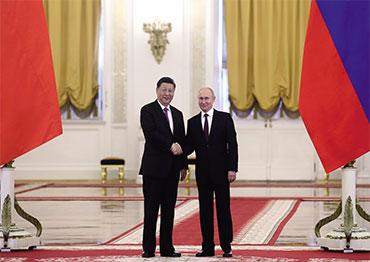While Putin said the joint statement “reflects the unique role of this instrument in the establishment of the modern model of Russian Chinese relations and their importance for the establishment of a fairer international order,” Xi said the China-Russia relationship has helped uphold “true multilateralism and global justice.”
Amid increasing US pressure on Moscow’s handling of domestic political opposition and Beijing’s stance on issues relating to Hong Kong, Xinjiang, and Taiwan, both leaders reiterated their opposition to interference in other countries’ domestic affairs “in the name of so-called democracy and human rights, and to unilateral sanctions.”
Signed in July 2001 in Moscow, the FCT outlines guidelines for strategic cooperation between China and Russia. The most talked about part in the West is Article 9, which states: “When a situation arises in which one of the contracting parties deems that peace is being threatened and undermined or its security interests are involved or when it is confronted with the threat of aggression, the contracting parties shall immediately hold contacts and consultations in order to eliminate such threats.”
For many observers, the clause implies that if one of the two countries comes under attack, the other would be obligated to react, which provides a foundation for a full military alliance. In the past years, there has been much discussion about a possible formal alliance between China and Russia, especially after Putin said last fall that the prospect of a military alliance with China cannot be ruled out entirely.
According to Professor Yan Xuetong, dean of the Institute of International Relations at Tsinghua University, despite closer ties between Russia and China, the two countries will not form a military alliance. “While Beijing has said there is no ceiling for the development of the China-Russia relationship, their cooperation will never reach the level of the US and its military alliances,” Yan said.
On the contrary, both China and Russia appear to be trying to distinguish their partnership from what the joint statement called the US-led “Cold War-era military alliance.” While Xi described the China-Russia relationship as “a gold standard of a new model of international relations,” Putin called it “an example of 21st-century interstate cooperation."
In an editorial published on June 28, the State-owned Global Times claimed in an editorial that Washington thinks it can drive a wedge between Russia and China by talking about which side in the bilateral relationship is dominant because “the alliance of the US and other Western countries is dominated by Washington” and that serves “the US’s hegemonic strategy.”
“By contrast, China and Russia are equal in their comprehensive strategic partnership,” says the editorial, “Neither China nor Russia will tell the other side how to deal with relations with the US or any other third country.”
So far, the status of China-Russia relations appears to suit both countries’ global diplomatic approach. For years, China has been promoting the concept of a “new-type of major power relationship,” which centers around ideas of equality and mutual respect. Russia, for its part, has been striving for global recognition as a great power.
In an article published in Singapore-based newspaper Lianhe Zaobao, Xiang Lanxin, a professor at the Graduate Institute of International and Development Studies in Geneva, argued that a major policy adjustment in Biden’s rapprochement with Russia is to deal with Russia on level ground.
In his summit with Putin, Biden referred to the US and Russia as “two great powers,” which marks a change from the rhetoric of former US president Barack Obama, who called Russia “a regional power” in 2014 and downplayed Russia’s global role in the following years. By recognizing Russia’s global status, Biden could manage to stabilize the bilateral relationship, but most experts believe that it will have no major impact on China-Russia ties.

 Old Version
Old Version

